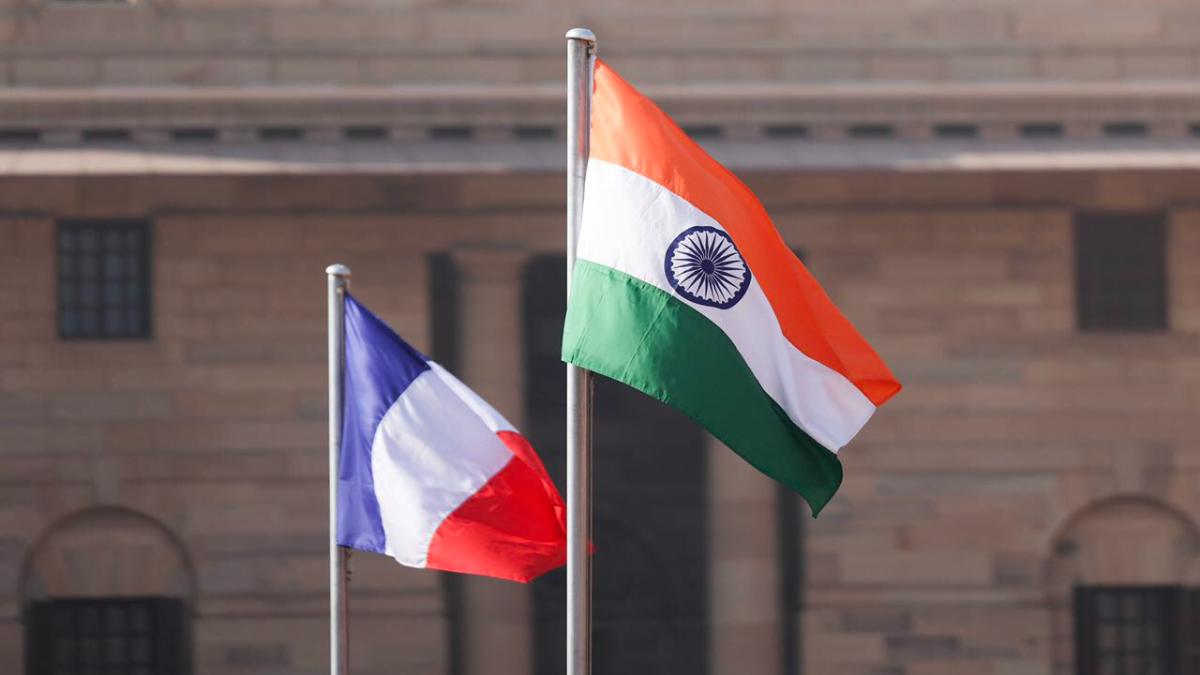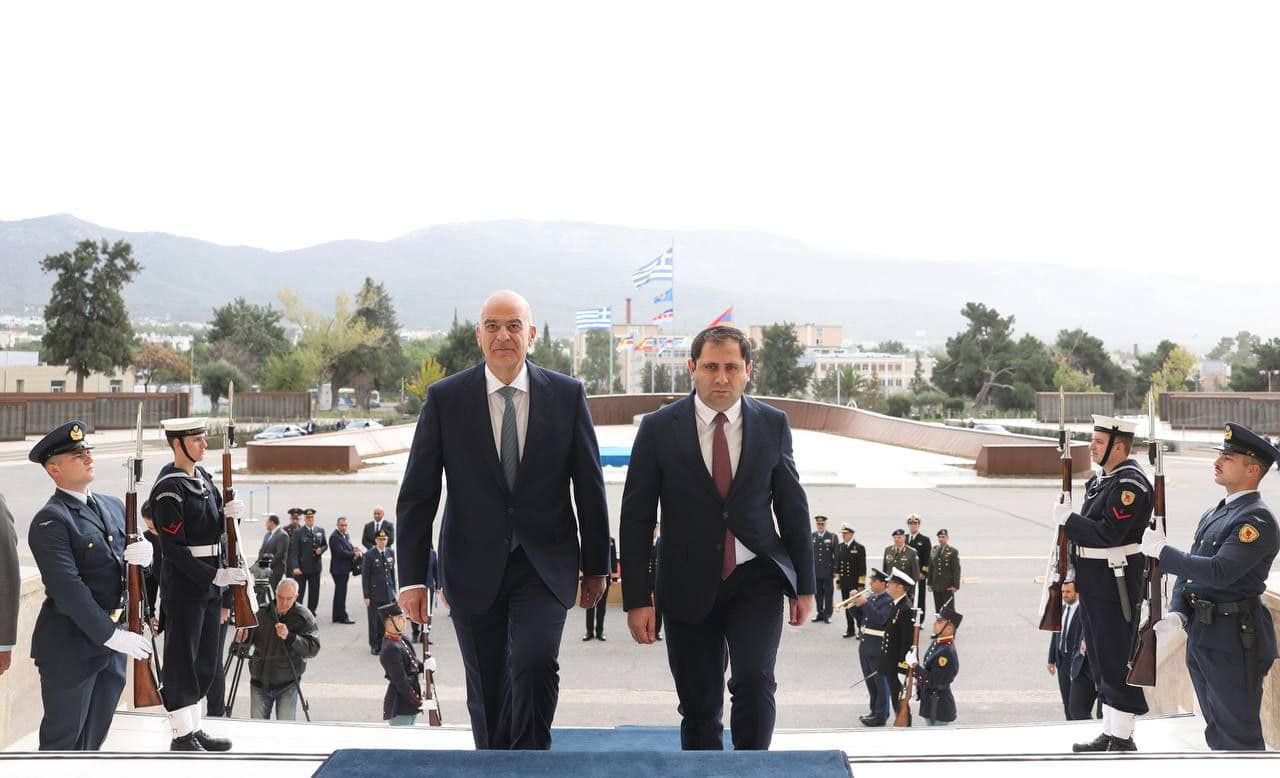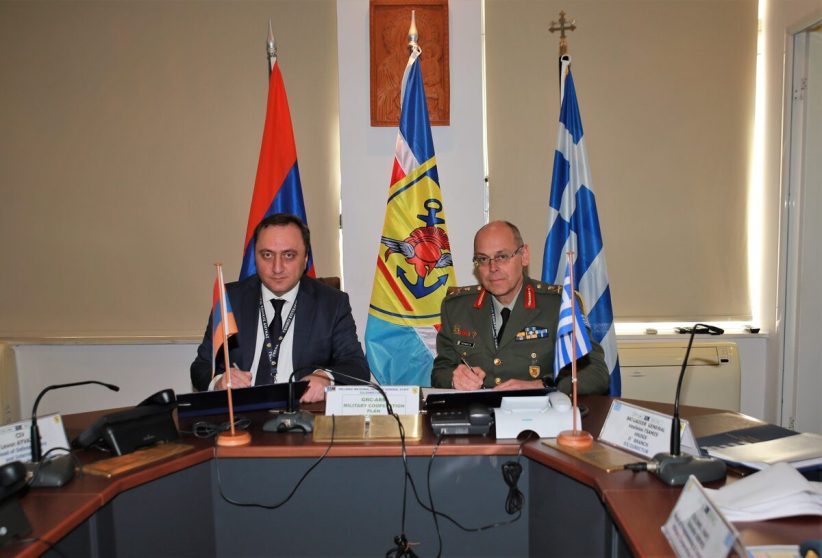Armenia and Greece are discussing a quadrilateral format for military cooperation
Cooperation in the Armenia-Greece-France-India format
“We have created successful trilateral defense cooperation between Armenia, Greece, and Cyprus. But there can be other trilateral or quadrilateral relationships – with France and India, with important countries, major powers, very influential common friends of Armenia and Greece,” stated Greek minister of National defense Nikos Dendias in Yerevan.
The head of Armenia’s Defense ministry, Suren Papikyan, confirmed: “Opportunities for cooperation in a multilateral format with other friendly countries sharing the same values were discussed with the Greek colleague.”
Political scientist Robert Gevondyan believes that the creation of the Armenia-Greece-France-India format is realistic, as it is in the interests of all four countries. Military expert Leonid Nersisyan emphasizes that not only Armenia is interested in cooperation with each of these countries:
“Today, France and India are developing ties between themselves. Greece has very strong military cooperation with France. India and Greece are also interested in deepening cooperation.”
More details on the negotiations between the defense heads of Armenia and Greece, as well as comments from experts.
- “Armenia’s prosperity is possible only with Europe” – Greek Foreign Minister
- “France to help protect Armenia’s skies”. Signing of documents in Paris
- Are there countries ready to sell weapons to Armenia? Opinions from Yerevan
Cooperation will continue in traditional areas and will be supplemented by new ones
After negotiations in both narrow and expanded formats, the ministers made statements. Nikos Dendias said that Armenia and Greece could establish successful cooperation “in finding innovative solutions in the field of defense”:
“I was pleased to inform you about the […] new research and innovation center in Greece. We would be happy if Armenian companies contribute [to its work].”
The Greek minister reminded of the military cooperation program between the two countries, emphasizing educational projects. Dendias mentioned that many Armenian military personnel were trained in Greek military schools and added that Greece is ready to accept even more cadets in the coming years.
The Armenian defense minister also spoke about the traditional areas of military cooperation with Greece — personnel education and training, exchange of experience and information. Afterwards, Suren Papikyan announced that there are agreements on new directions of cooperation, though he did not specify which ones.
He reported that military-technical cooperation issues were also discussed with the Greek counterpart.
Comments
Leonid Nersisyan, a senior research fellow at the APRI analytical center in Armenia and a military expert, believes it is significant that the Greek side initiated the discussion on the quadrilateral format. Therefore, it’s not only Armenia that’s interested:
“It seems to me this is a good sign, it indicates that practical implementation of this idea can be expected.”
If India and France are new partners in the defense sphere, Greece has been cooperating with Armenia for a long time, says Nersisyan. At the same time, he believes, defense ties with all these countries are quite significant, and there is potential for further deepening of relations:
“There is a considerable potential for implementing additional projects with Greece, for example, in military-technical areas. In the future, joint military exercises could also be attempted.”
Nersisyan does not exclude the implementation of joint projects in the defense industry as well.
The expert emphasizes that Armenia should make every effort to realize the Armenia-Greece-France-India format. According to him, these countries already play a significant role in Armenia’s defense sphere. In particular, India is the country’s largest partner. 80 percent of defense purchases are made in this country. There has also been progress with France in this direction.
The creation of this quadrilateral format in the near future is quite realistic, since Armenia, Greece, France, and India already have experience in bilateral cooperation, believes political scientist Robert Gevondyan.
He suggests that the Greek Defense Minister would not have made such a statement without prior discussions with all parties. Moreover, the expert sees a commonality of interests among the named countries:
“It’s not just that Turkey is a problem for both Armenia and Greece. We must not forget that there is Russia, with which we are currently in a state of hybrid war. And it is effectively in a state of proxy and hybrid war with the West. In this sense, Armenia is of interest to Greece, France, and India. Because they also have interests related to and unrelated to the Russian Federation, which at this moment coincide with the interests of Armenia.“
According to the expert, this quadrilateral format could provide Armenia with more opportunities to diversify its security sphere. This includes cooperation “with states from the southern and eastern parts of Europe, which have very close ties with Greece.” Gevondyan, without naming these countries, asserts that “they are currently refraining from active steps, considering a number of circumstances,” the main one being Armenia’s membership in the pro-Russian military block CSTO:
“When Armenia exits the CSTO, the pace of diversification and transformation of the security system will accelerate several times.”
The political scientist reminds that Yerevan is already cooperating with NATO and individual countries that are members of this alliance. However, they are cautious since Armenia has obligations to the CSTO. There are other factors for caution and limiting possible assistance to Armenia, Gevondyan believes. In particular, this includes the factor of relations with Azerbaijan.
“All these restrictions slow down Armenia’s progress in the defense sphere to such an extent that it can be said — at this moment we are still in a phase of recovery,” he said.





















